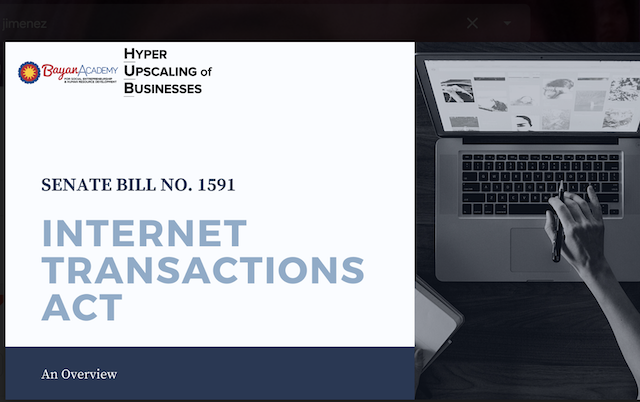Internet Transactions Act and its impact on micro & small enterprises
Have you heard of the Internet Transactions Act? The pending bill is significant in the light of the increase of micro and small enterprise during this pandemic.
The explanatory note of the Internet Transactions Act or Senate Bill 1591 seeks to create an environment founded on trust among consumers and merchants, as a means to increase the number of eCommerce participants, and ultimately achieve sustainable growth. The key problems and issues facing the Philippine eCommerce environment are:
-Lack of trust;
– Internet infrastructure (Low internet speed experienced in Philippines);
– Logistics infrastructure (Weak last-mile delivery options; challenging topographical structure);
– Payment mechanisms (Payment gateways and currency exchange rates; Majority still prefer to pay in local currency against foreign currency);
-Lack of governing entity at the regional level that can fight cybercrime and settle cross-border disputes;
-Difficulty in the process of returning product;
-Taxation (VAT, customs duties and other charges, de minimis threshold, VAT registrations of foreign eCommerce operators, 12% VAT on total value of online transactions in the Philippines); and
-Online consumer complaints.
Philippine MSMEs lag behind the adoption of eCommerce because enterprises either find using digital technology platforms and tools too difficult, or are unaware of the benefits they offer.
Industries covered by the bill are the following:
1.Internet retail of consumer goods,
2. Online travel services covering the purchase of flights, hotel accommodations, and vacation rental spaces
3. Digital media providers, including advertising,, gaming, music subscription, and video on demand
4. Ride hailing service is her personal transport, delivery of food and merchandise
5. Financial services offered through digital online platforms, such as online payments, remittances, online landing, online investment, and online insurance services
Senate Bill also creates an eCommerce Bureau to serve as the governing body in charge of the implementation and enforcement of the law, and provides for a dispute resolution mechanism specific to eCommerce disputes.
To engage in e-commerce, the qualifications are as follows:
-A Filipino individual who is duly licensed to do business as a single proprietor with the DTI
-Filipino juridical entity that is Julie register to the Securities and Exchange Commission weather as a corporation, a one-person corporation, or as a partnership
-A Filipino cooperative that is Julie license in with the cooperative development authority
– A foreign corporation that is duly licensed by the SEC to transact business in the Philippines
There is a need for rules and regulations governing eCommerce.
There is a need to protect consumers from unscrupulous sellers.
However, the role of legal and institutional factor is twofold – to create an environment where:
- Consumers are protected through regulation on privacy, data, redress, as well as ensuring the legitimacy of transactions
- Doing business through eCommerce is convenient, easy, and readily accessible
Good eCommerce regulation should find the balance between protecting consumers and building a supportive environment for online businesses
Furthermore, the bill does not address some of the key issues that it identifies, namely:
- The difficulty of MSMEs in adopting eCommerce practices
- Weak internet and logistics infrastructure
Here are the recommendations of Bayan Academy
- Harness
Make it easier for people to start businesses online by decreasing barriers to entry.
Many micro entrepreneurs would think twice about starting online given the provisions of the bill
Possible recommendations:
- “Graduated” or “ladderized” registration
–Revenue-based
–Time-based
- Incentivized voluntary registration – eCommerce trust mark awarded to those with complete registrations
2. Innovate
Empower the eCommerce Bureau by making it more than a just an implementing and recommendatory body
Typically, regulations are not ‘future-proof’. They tend to be prescriptive in nature, take months or years to enact, require the review of extensive public comments and stay rigid once created.
For innovation to thrive, agile and responsive regulation will be crucial in the post-pandemic world. Business models are changing rapidly, and regulators will need to keep pace with these changes without stifling innovation.
Recommendation:
The eCommerce Bureau be tasked with formulating the rules and regulations which will govern eCommerce transactions.
With the caveat that public consultation with stakeholders on these proposed rules be required
3. Protect
Enhance cybersecurity for businesses by ensuring the safety of their published registration documents
Publishing important business registration documents online will make it susceptible to copying.
Recommendation
Integrate business registration documents with the eCommerce trust mark.
- Documents may be housed in the DTI website instead of the eCommerce platform
4. Connect
Utilize government revenues generated as a result of the ITA to support eCommerce growth and PH internet infrastructure
Recommendation:
Allot a portion taxes from eCommerce transactions for ICT development initiatives such as:
- Internet and delivery infrastructure development
- Cybersecurity initiatives
- Digital literacy programs for consumers and MSMEs
Here is the position paper of Bayan Academy for Social Entrepreneurship and Human Resource Development
Position Paper on Internet Transactions Act – As of 12 Feb 2021 (v3) by BlogWatch.ph on Scribd

